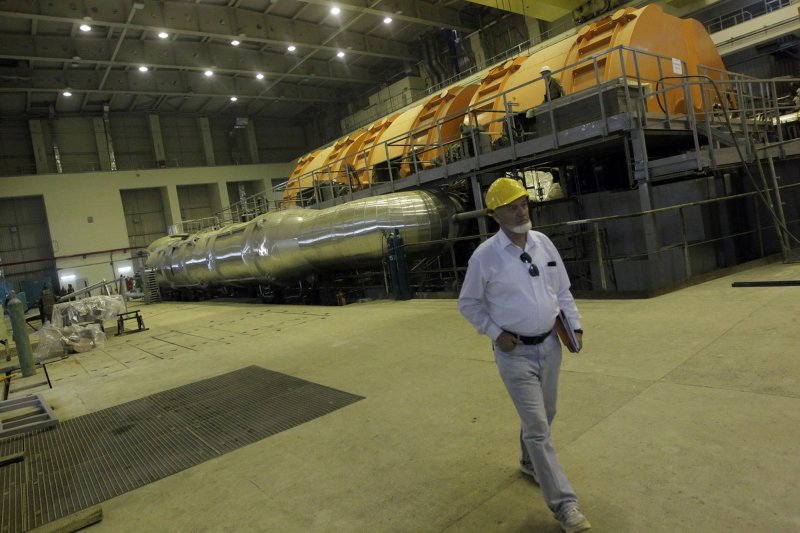An interior view of the Bushehr nuclear power plant some 745 miles south of Tehran. The Russian-built power plant is supervised by the United Nation's nuclear agency. UPI/Mehr News Agency/Majid Asgarpour |
License Photo
GENEVA, Switzerland, Nov. 9 (UPI) -- A draft agreement curbing Iran's nuclear program does not go far enough, French Foreign Minister Laurent Fabius said Saturday at talks in Geneva, Switzerland.
Fabius' objection laid bare disagreements among the six countries negotiating with Iran, The New York Times reported. The talks involve the five permanent members of the U.N. Security Council -- the United States, Britain, France, Russia and China -- plus Germany and Catherine Ashton, the European Union's foreign policy head.
U.S. Secretary of State John Kerry interrupted a trip to the Mideast to fly to Geneva Friday and spent 2 hours Saturday in talks with his Iranian counterpart, Mohammed Javad Zarif.
Zarif told the BBC this round of talks appeared likely to end without an agreement but he said progress has been made.
"That won't be a disaster because we have started an important process and, provided that we can continue this process and try to reach positive results, I think we've done extremely important work," he said.
Fabius told France Inter Radio he also expected the talks to end inconclusively.
"We are hoping for a deal, but for the moment there are still issues that have not been resolved," he said.
U.S. officials said they hoped for an agreement with Iran for a six-month freeze on nuclear development, giving negotiators time to work out a permanent settlement, the Times said.
"It's important that Iran knows we'll walk away if our concerns aren't met, but we do have substantive outlines set well enough that it's worth trying to narrow gaps," a senior official with the Obama administration told the newspaper.
The United States has offered Iran a diplomatic carrot, proposing to release billions of dollars of frozen funds in stages in return for concessions. Iranian negotiator Majid Takht-Ravanchi has told the Iranian news agency Mehr that freeing up those funds must be one of the first issues to be tackled.
Iran has said it has no intention of suspending its work to enrich plutonium.
British Foreign Secretary William Hague said negotiations were moving much faster than talks a few months ago and urged those at the meeting to "seize the moment," the BBC reported.
Israeli Prime Minister Binyamin Netanyahu has said his country would not be obliged to abide by any deal with Iran.
Hague asked Netanyahu to have patience, noting that "we haven't done the deal yet," CNN reported. He said any agreement would "require some flexibility on all sides."















